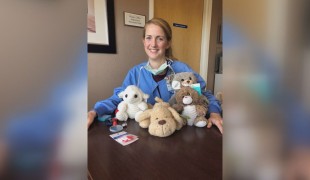- 4241
- 371
- 12
- 8
- 0
- Help Ukraine
About the solution
In the United States, some governmental agencies dedicated to elderly care, like the Florida Department of Elder Affairs and the Alabama Department of Senior Services (ADSS) have embarked in a pilot project to combat the loneliness and isolation of senior caused by the Covid-19 pandemic. Partnering with Ageless Innovation, a robot manufacturer, these government agencies will give robotic companion pets to isolated seniors. These robotic pets were designed to look, sound and feel like real animals. They have a “heartbeat” and respond to the owner’s voice and touch.
Previous studies have shown that therapy using robotic pets was highly successful in decreasing the feelings of social isolation, which was the motivation for the ADSS to get on board. “With our loneliness screening tool, we will be able to assess whether the pets are as successful in Alabama as they have been shown to be in other states. I am certainly hopeful about this pilot project during this time when many seniors have been choosing “safer at home” during this vile COVID-19 pandemic”, explained Jean Brown, ADSS commissioner.
"We know social isolation disproportionately affects older adults, and COVID-19 has required people with dementia and their caregivers to remain alone for extended periods of time. We look forward to delivering these therapeutic robotic pets to those who will benefit from their companionship", said Richard Produm, from the Florida Department of Elder Affairs.
Adapted from:
https://edition.cnn.com/2020/08/11/us/seniors-robotic-pets-loneliness-we...
https://edition.cnn.com/2020/04/27/us/therapy-robot-pets-wellness-trnd/i...
https://www.al.com/news/2020/08/life-like-robotic-pets-help-alabama-seni...
This solution shall not include mention to the use of drugs, chemicals or biologicals (including food); invasive devices; offensive, commercial or inherently dangerous content. This solution was not medically validated. Proceed with caution! If you have any doubts, please consult with a health professional.
DISCLAIMER: This story was written by someone who is not the author of the solution, therefore please be advised that, although it was written with the utmost respect for the innovation and the innovator, there can be some incorrect statements. If you find any errors please contact the patient Innovation team via info@patient-innovation.com
-
-
408
-
0
-
6128

Nurses create stuffed animals with recordings of loved-ones for patients with Covid-19
CAREGIVING
COMMUNICATION: Communicating, whether by speaking, listening, or other means
Social interaction
Covid19
Assistive Daily Life Device (to help ADL)
Educational/Leisure device (book, toy, game...)
Sore throat
Fever
Fatigue
Nasal congestion
Dry cough
Sharp chest pain worsened by breathing (pleuritic pain)
Sinus pain or pressure.
Shortness of breath
Promoting inclusivity and social integration
Enhancing Mental Health
Caregiving Support
General and Family Medicine
Infectious Diseases
Pneumology
Psychiatry
United States
-
-
-
430
-
0
-
4402

Student designs sensory pod inspired by autistic son
CAREGIVING
COMMUNICATION: Communicating, whether by speaking, listening, or other means
Attend Concerts/Performances
Autism
Strategy/Tip
Assistive Daily Life Device (to help ADL)
Irritability or anger outbursts
Panic attacks
Racing thoughts
Feelings of guilt or worthlessness
Fatigue
Promoting self-management
Building Supportive Community Relationships
Promoting inclusivity and social integration
Enhancing Mental Health
Improving Speech and Communication
Preventing (Vaccination, Protection, Falls, Research/Mapping)
Raise awareness
Caregiving Support
Child and Adolescent Psychiatry
General and Family Medicine
Pediatrics
Psychiatry
United Kingdom
-
-
-
375
-
0
-
4060

After losing son to rare disease, woman creates project to help mothers with children with special needs
CAREGIVING
COMMUNICATION: Communicating, whether by speaking, listening, or other means
Social interaction
Neuromuscular Disorders
Strategy/Tip
Social Media
Tremors
Muscle cramps or spasms
Stiffness or rigidity (difficulty moving)
Paralysis of the legs and lower body
Muscle weakness
Loss of balance
Trouble with fine motor skills (e.g., writing, buttoning clothes)
Numbness or tingling in the extremities
Twitching or involuntary movements (myoclonus)
Seizures
Enhancing health literacy
Building Supportive Community Relationships
Promoting inclusivity and social integration
Enhancing Mental Health
Preventing (Vaccination, Protection, Falls, Research/Mapping)
Raise awareness
Caregiving Support
General and Family Medicine
Neurology
Pediatrics
Psychiatry
Brazil
-
 en
en